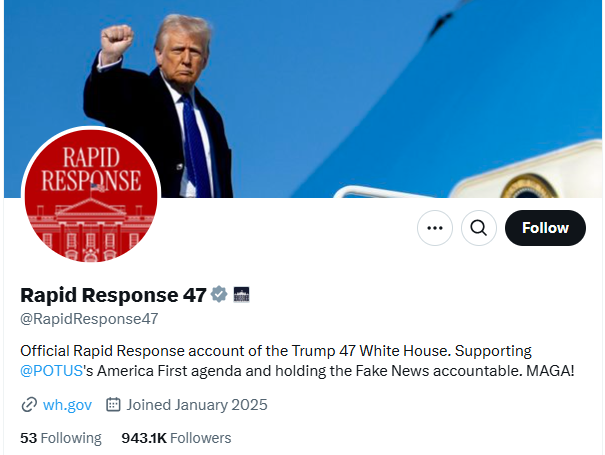In January 2025, the Trump White House unveiled a new Twitter/X account titled “Rapid Response 47.” From the perspective of digital diplomacy, such an account may be of strategic importance. The ubiquity of social media, smartphones, and digital technologies has ushered in an era of instantaneous news dissemination and real-time crisis communication. In this dynamic digital environment, diplomats and world leaders are increasingly expected to narrate, interpret, and influence unfolding global events as they occur.
A rapid response Twitter account can serve as a vehicle for quick and succinct diplomatic messaging, enabling leaders and officials to swiftly comment on breaking news and emerging crises. These digital bursts of diplomacy may then be amplified by journalists, news organizations, and everyday users seeking real-time updates during critical moments. Additionally, rapid response accounts may play an important role in the swift debunking of digital misinformation and disinformation; the faster a false narrative is countered, the less traction it is likely to gain.
However, a closer analysis of this account reveals that its main purpose is to rapidly publish information praising President Trump and attacking his opponents. Notably, although this is an official account associated with the White House, its biography is decidedly unofficial and reads “Official Rapid Response account of the Trump 47 White House. Supporting @POTUS‘s America First agenda and holding the Fake News accountable. MAGA!”
An analysis of the account, which already boasts over 900,000 followers, reveals its focus on four recurring themes. The first theme focuses on the American economy. A significant portion Tweet promotes the economic successes allegedly spurred by Trump’s policies, collectively branded under the term “Trump Effect.” These tweets assert that under Trump’s leadership, the U.S. is flourishing economically and attracting substantial international investment. Notably absent, however, are references to the trillions of dollars lost in global and domestic markets since his return to office.
Immigration is a second dominant theme. The account frequently posts statements by Trump administration officials condemning undocumented immigrants and advocating for stringent immigration policies while also “proving” how impactful Trump’s policies have been in securing Americas southern border. These posts often include inflammatory language, referring to migrants as “illegal alien criminals, gangbangers, and wife beaters,” and casting Democratic lawmakers as “full-blown crazy.” Liberal media outlets are routinely mocked on the account and dismissed as biased.
The account also serves as a megaphone for the President’s personal posts on Truth Social. Many of these reposts concern international affairs, ranging from Trump’s meetings with world leaders to responses to events such as terrorist attacks in Kashmir. This cross-platform strategy enables Trump’s messaging on Truth Social to rapidly reach a broader audience on Twitter.
Lastly, a steady stream of tweets is dedicated to congratulating President Trump, often portraying his actions as “historic” or unprecedented. These tweets frequently include praise from administration officials and selectively chosen media clips that celebrate Trump victories or favorable moments.
The Rapid Response account is a fascinating example of the direction in which digital diplomacy is headed. In more and more cases, diplomats and diplomatic institutions use social media not as “spokespeople” but as “people who speak”. While Twitter accounts remain official channels for government communication, the content and tone used by diplomats is anything but diplomatic.
This is true of Chinese diplomats who use social media to lambast America and decry the hypocrisy of the international community, of Israeli diplomats that lash out at media channels and of the Trump White House that has an account dedicated to rapidly attacking critics of the President and celebrating supposed achievements. It thus not an account run by “spokespeople” but by “people who speak”. Although the social media accounts of “people who speak” may trend more often and attract more followers, they can cause tremendous harm as they breed tensions between states, hamper the work of international organizations, polarize diplomacy and prevent cross-state cooperation and may lead to the radicalization of domestic audiences who follow diplomats and adopt a negative outlook on diplomacy, diplomatic functions and diplomatic arenas.
The blend of domestic and foreign affairs on the Trump Rapid Response accounts is also emblematic of the blending between the foreign and the domestic seen across digital diplomacy accounts which are increasingly used to target domestic social media users and not foreign ones. Crucially, despite its tone and topics, the Rapid Response account is already followed by dozens of diplomats. Ambassadors, MFAs and diplomatic institutions who may be hoping to gain better insight into the President’s mindset and the White Houses’ agenda.
















